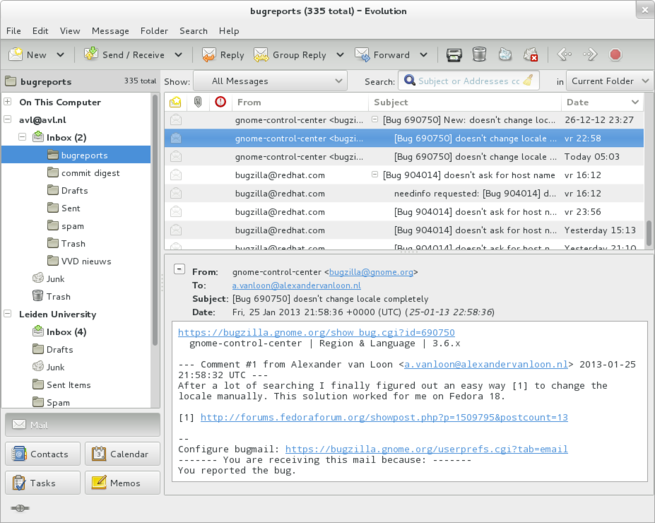
Main Difference
The main difference between Email and Gmail is that the Email is a method of exchanging digital messages between people over a network and Gmail is a Google’s email service
-
Email
Electronic mail (email or e-mail) is a method of exchanging messages (“mail”) between people using electronic devices. Invented by Ray Tomlinson, email first entered limited use in the 1960s and by the mid-1970s had taken the form now recognized as email. Email operates across computer networks, which today is primarily the Internet. Some early email systems required the author and the recipient to both be online at the same time, in common with instant messaging. Today’s email systems are based on a store-and-forward model. Email servers accept, forward, deliver, and store messages. Neither the users nor their computers are required to be online simultaneously; they need to connect only briefly, typically to a mail server or a webmail interface for as long as it takes to send or receive messages.
Originally an ASCII text-only communications medium, Internet email was extended by Multipurpose Internet Mail Extensions (MIME) to carry text in other character sets and multimedia content attachments. International email, with internationalized email addresses using UTF-8, has been standardized, but as of 2017 it has not been widely adopted.The history of modern Internet email services reaches back to the early ARPANET, with standards for encoding email messages published as early as 1973 (RFC 561). An email message sent in the early 1970s looks very similar to a basic email sent today. Email had an important role in creating the Internet, and the conversion from ARPANET to the Internet in the early 1980s produced the core of the current services.
-
Gmail
Gmail is a free email service developed by Google. Users can access Gmail on the web and using third-party programs that synchronize email content through POP or IMAP protocols. Gmail started as a limited beta release on April 1, 2004 and ended its testing phase on July 7, 2009.
At launch, Gmail had an initial storage capacity offer of one gigabyte per user, a significantly higher amount than competitors offered at the time. Today, the service comes with 15 gigabytes of storage. Users can receive emails up to 50 megabytes in size, including attachments, while they can send emails up to 25 megabytes. In order to send larger files, users can insert files from Google Drive into the message. Gmail has a search-oriented interface and a “conversation view” similar to an Internet forum. The service is notable among website developers for its early adoption of Ajax.
Google’s mail servers automatically scan emails for multiple purposes, including to filter spam and malware, and to add context-sensitive advertisements next to emails. This advertising practice has been significantly criticized by privacy advocates due to concerns over unlimited data retention, ease of monitoring by third parties, users of other email providers not having agreed to the policy upon sending emails to Gmail addresses, and the potential for Google to change its policies to further decrease privacy by combining information with other Google data usage. The company has been the subject of lawsuits concerning the issues. Google has stated that email users must “necessarily expect” their emails to be subject to automated processing and claims that the service refrains from displaying ads next to potentially sensitive messages, such as those mentioning race, religion, sexual orientation, health, or financial statements. In June 2017, Google announced the end to the use of contextual Gmail content for advertising purposes, relying instead on data gathered from the use of its other services.By 2018, Gmail had 1.5 billion active users worldwide.
-
Email (noun)
A system for transferring messages from one computer to another, usually via a network.
“He sent me his details via email.”
“The advent of email has simultaneously brought our society closer together and farther apart.”
-
Email (noun)
A message sent via an email system.
“He sent me an email last week to that effect.”
“I am searching through my old emails.”
-
Email (noun)
A quantity of email messages.
“I am searching through my old email.”
“My inbox used to allow only 50 MB of email at a time until last year, when they upgraded it to 2 GBs!”
-
Email (noun)
An e-mail address.
“What’s your email?”
“Don’t send personal messages to my work email.”
-
Email (noun)
a raised or embossed image pressed into metal, such as a seal pressed into a foil and attached to a document
-
Email (noun)
A type of dark ink
-
Email (verb)
To send an email or emails to.
“She emailed me last week, asking about the status of the project.”
-
Email (verb)
To send, or compose and send, an email or emails.
“Most teenagers spend twenty-six hours a day emailing and surfing the Web.”
-
Email (verb)
To send via email.
“I’ll email you the link.”
“He emailed the file out to everyone.”
-
Email (noun)
messages distributed by electronic means from one computer user to one or more recipients via a network
“reading email has become the first task of the morning”
“email messages”
-
Email (noun)
the system of sending messages by electronic means
“a contract communicated by email”
-
Email (noun)
a message sent by email
“I got three emails from my mother today”
-
Email (verb)
send an email to (someone)
“you can email me at my normal address”
“call, fax, or email for a free demo”
-
Email (verb)
send (a message) by email
“employees can email the results back”
